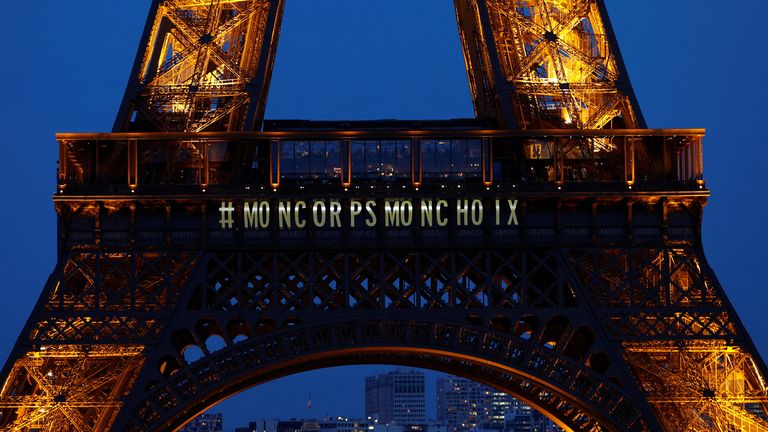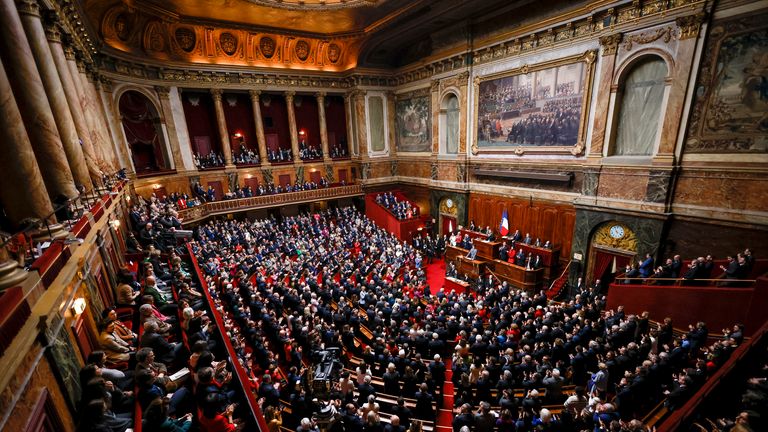
Faith Nyasuguta
In a momentous and historic move, France has positioned itself at the forefront of women’s reproductive rights by becoming the first country in over half a century to constitutionally guarantee the right to abortion.
This landmark decision, responding to concerns over the tightening of abortion laws in the United States, unfolded during an extraordinary joint session of parliament held at the opulent Palace of Versailles. The result was nothing short of resounding, with a vote count of 780-72 in favor of amending Article 34 of the French constitution.
This constitutional amendment specifically outlines that “the law determines the conditions by which is exercised the freedom of women to have recourse to an abortion, which is guaranteed”
The exceptional parliamentary session brought together both houses, the National Assembly and the Senate, signifying the gravity of the matter. Prime Minister Gabriel Attal, addressing the assembled MPs and senators beneath the gilded ceilings of Versailles, encapsulated the essence of the moment: “We’re sending a message to all women: your body belongs to you and no one can decide for you.”

The scenes that unfolded in the wake of this historic vote were jubilant, not just within the grand walls of Versailles but resonating across France. Women’s rights activists, who had long championed such a measure, hailed the outcome as a crucial step forward.
This decisive action was promised by President Emmanuel Macron, particularly in response to the reversal of abortion rights in the United States, where a 50-year-old ruling was overturned by the Supreme Court in 2022.
The introduction to the French legislation acknowledged the global context, citing events in the US, and noted the presence of currents in various countries, even within Europe, seeking to impede the freedom of women to terminate pregnancies. The constitutional amendment solidifies France’s commitment to protecting this fundamental right, making it the first country since the former Yugoslavia in 1974 to establish a constitutional right to abortion.
The significance of this decision extends beyond the French borders, echoing a commitment to progressive values. Prime Minister Macron’s words underscored this commitment, emphasizing the message to women that their bodily autonomy is sacrosanct. The move is a response to global challenges to reproductive freedom and reinforces France’s dedication to being a trailblazer in women’s rights.
In the aftermath of the parliamentary triumph, President Macron took to social media, welcoming the “entry of a new freedom guaranteed in the constitution.” He extended an invitation to the public to attend a sealing ceremony scheduled for International Women’s Day on March 8. This gesture not only signifies the formal acknowledgment of this constitutional shift but also emphasizes the broader societal celebration of women’s rights.
Despite the overwhelming support for the amendment, it is essential to acknowledge the political landscape. None of France’s major political parties questioned the right to abortion, and polls consistently show approximately 80% of French people supporting the legality of abortion. However, the amendment is not devoid of political implications. As European elections loom, President Macron has reportedly sought to set himself apart from the far-right National Rally party.

The National Rally, led by Marine Le Pen, holds a substantial position in the polls. Notably, 46 of its 88 MPs voted in favor of the constitutional revision. However, Le Pen criticized Macron, accusing him of exploiting the bill for political gains.
While supporting the inclusion of the amendment in the constitution, she downplayed its historical significance, asserting that the right to abortion in France was not under threat.
Amending the French constitution is a rare event, occurring only 17 times since its enactment in 1958. The last such amendment took place in 2008, granting more powers to parliament and empowering French citizens to bring their grievances to the Constitutional Court. This infrequency underscores the gravity of the decision and its lasting impact on French society.
The commitment to making women’s right to abortion irreversible through constitutional enshrinement reflects President Macron’s progressive agenda.
RELATED:




